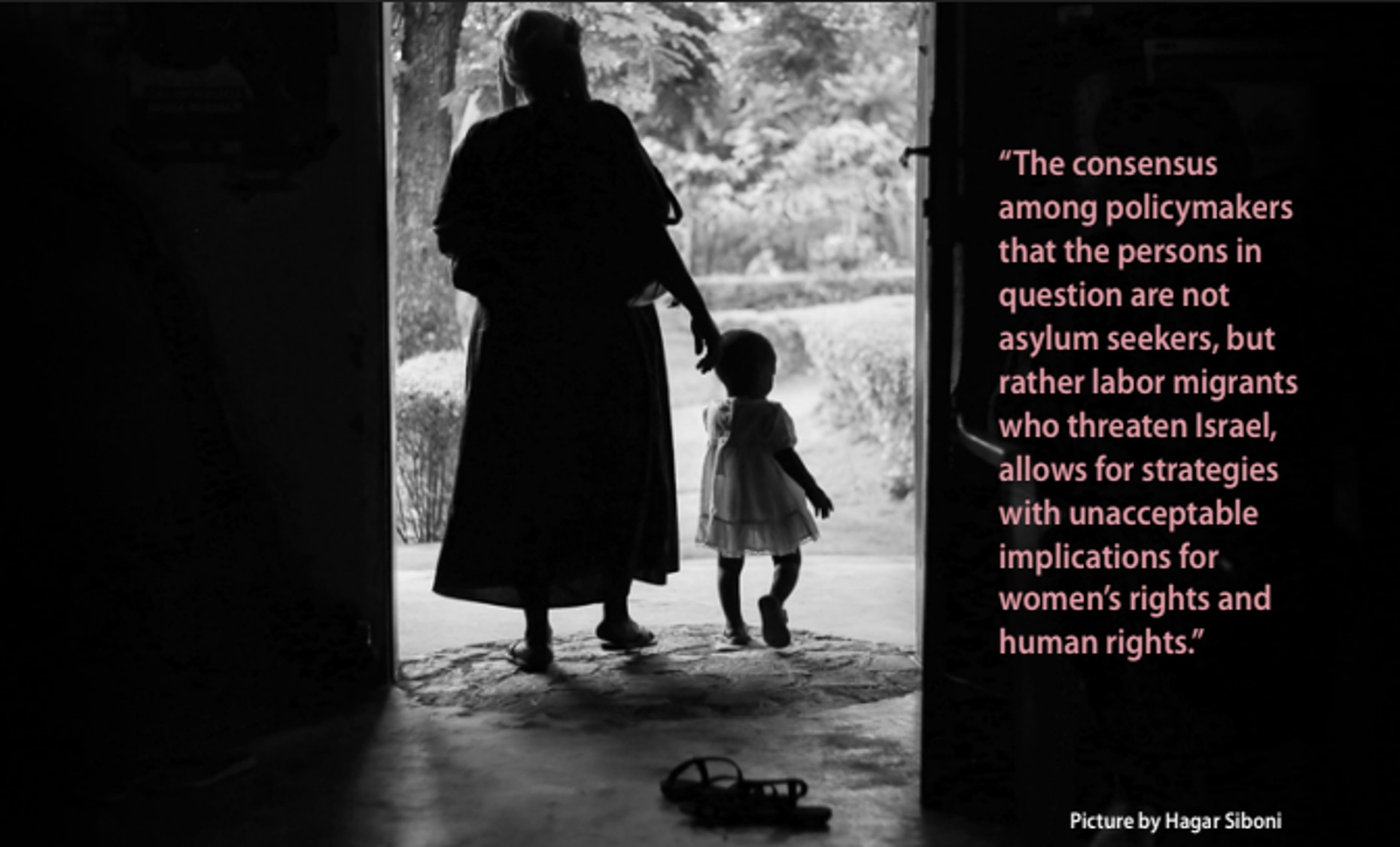
This article offers criticism of Israel’s current policies toward asylum seekers by analyzing their effects from a gender perspective. The author offers a powerful call for the Israeli Government to ensure that women’s health and security do not become casualties of these policies.
Israel has declared that its general policy towards asylum seekers is to limit their number by creating various obstacles that exhaust them and create a sense of desperation, thus coercing them into leaving. Lacking sensitivity to gender differences and unresponsive to women’s needs, this policy has particularly harsh implications for women, impacting their individual bodies and placing them at the center of the political struggle.
Women Asylum Seekers in Israel
Although Israel ratified both the 1951 United Nations Convention relating to the Status of Refugees and the 1967 Protocol, it has been reluctant to host refugees in practice, claiming asylum seekers are labor migrants who threaten Israel's national security as well as its Jewish character. Instead, Israel pursues a policy of temporary non-deportation, which only offers a provisional stay whilst withholding asylum seekers’ wages and limiting their access to medical and welfare services while also detaining large numbers of men in a designated detention center.
Public policy implications often impact men and women differently due to social and biological differences. Yet, gender implications are rarely analyzed systematically, thus creating a situation in which women's individual bodies are directly influenced in the process to advance political agendas. This is particularly true in the case of asylum seekers in Israel. For instance, lack of welfare services for asylum seekers in general may entail no protection for women in cases of domestic violence. Limited access to health services in general may prevent antenatal care (ANC) for pregnant women, specifically.
Reluctance to Protect Women Asylum Seekers in the Face of Domestic Violence
Israeli law strongly condemns domestic violence and has introduced concrete measures combating violent behavior of this kind. By law, every woman, regardless of age, religion, nationality, or origin, can be referred to a women's shelter when facing physical or emotional danger that prevents her from staying safely at home. Referral channels range from the police, to hospitals, to welfare authorities and various NGOs.
In the case of women asylum seekers, however, the state refuses to enforce this law, and denies them welfare services. The official policy allows the referral of an asylum seeker to a women's shelter only in case of immediate danger, and only for a temporary stay. In reality, this limited haven is even less accessible due to complicated bureaucratic procedures, language barriers, and difficulties in proving immediate danger. Women who have tried to seek the authorities' help in cases of domestic violence report a dismissive attitude and a lack of any kind of intervention. This policy, together with the lack of traditional community structures normally used to settle disputes within families, leaves women asylum seekers in Israel without remedies for domestic violence.
Lack of Access to Reproductive Health Services and Antenatal Care
As a matter of policy, asylum seekers in Israel have no access to health services and medical care, except in emergency situations. Thus, medical services are available only to those who can afford them, or for those whose workplaces follow state employment rules and provide medical insurance to employees. This creates a situation where many women can't access reproductive health services, and pregnant women cannot access ANC.
ANC from a medically-trained provider is an essential service for pregnant women, aimed at ensuring healthy pregnancy outcomes. Specifically, ANC also links the pregnant woman and her family to formal health systems, thus increasing the chance of having skilled birth attendants present at delivery, which drastically reduces the risk of maternal and infant mortality. By limiting their access to such services, the Israeli policy creates a situation in which women asylum seekers' basic right to health care is neglected, and their ability to choose the place where they will give birth is restricted.
Making Women Asylum Seekers’ Bodies Sites for Political Struggle
The consensus among policymakers that the persons in question are not asylum seekers, but rather labor migrants who threaten Israel, allows for strategies with unacceptable implications for women’s rights and human rights. These implications are not small-scale phenomena impacting only a minority of women asylum seekers living in Israel. In fact, most women asylum seekers in Israel are of a reproductive age. Moreover, 80 interviews conducted recently by the Aid Organization for Refugees and Asylum Seekers in Israel (ASSAF), revealed that 48 women (60 percent of all interviewees), have experienced domestic violence. This implies that Israel is, in fact, systematically preventing safe haven for women asylum seekers.
The systematic violation of women asylum seekers’ basic rights in the name of the country's security manifests a process of politicization of their bodies. Although it is not women's bodies that are at the center of this policy or the debate over it, the de facto implications discussed above makes them a site for political conflict and thus politicizes them.
This process of politicization is also evident in the recent policy proposal made by Israel's Minister of Interior, which includes enforcing laws prohibiting the employment of asylum seekers. This proposal, which will push asylum seekers into greater poverty, entails distinct repercussions for women, as in the face of no legal employment, along with the need to provide for themselves and their families, many more women asylum seekers may be pushed into illegal sex work.
Although the recent policy developments towards refugees in Israel require immediate scrutiny to prevent the violation of human rights for the entire community, the need to analyze it though a gender perspective is also pressing. The bodies of women asylum seekers should not become sites for political conflict in the quest to limit asylum seekers’ numbers in Israel.
Hagar Siboni


